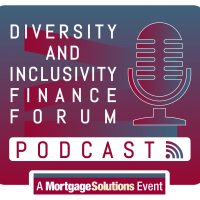
It also heard about the steps two major financial organisations are taking to engage with people from diverse and underrepresented groups within their workforces.
Real examples were relayed of how diverse backgrounds can bring benefits in the mortgage industry.
Speaking on the podcast, Ali Crossley, managing director of partnerships at Legal & General Insurance, explained how important it was to be driving change within workplaces to make them more diverse and inclusive.
“It’s about how everyone can be themselves in the workplace no matter what they look like, where they come from, what they sound like or anything else,” she said.
“And any benchmarks or focus, on insuring that is absolutely the case, and making organisations really think about it, and no longer being silent on these matters, is important.
“Silence is a form of complicity, frankly. We’ve avoided these difficult conversations for too many decades and it feels now is a time for us to act.
“It’s fantastic that we’re having this conversation and that we see many organisations rallying around and really focusing in this space.
“I really hope this is the decade we see a seismic shift in these areas that need to have been sorted out years ago,” she added.
Helped brokers and underwriters to understand
Crossley was speaking to AE3Media ambassador at large Bharat Sagar, and they were joined by Saj Latif, national account manager at Lloyds Banking Group.
Latif discussed his experiences growing up and being the only Muslim child in a Roman Catholic school before then entering the world of finance.
He explained how his background had helped to support customers who may otherwise have lost out and gave a powerful example:
“Being able to understand how the Asian community works has definitely helped,” Latif said.
“Not many people understand some customs in Asian community, especially when it comes to financing and getting onto the housing ladder. They will build a deposit through effectively a social savings scheme called a Kamaytti.
“Say you have ten people saving £100 a month, and in ten months’ time will earn £1,000. This Kamaytti lets you pull out that £1,000 early, but you have to keep paying in for the full ten months.
“What I’ve previously done when I’ve talked to brokers about this, I’ve helped our underwriters to understand the concept, and this has definitely helped brokers and in turn customers to secure finance.
“Without that knowledge, the customers would not have had the finance to buy the house, certainly not at that time through us,” he added.
Role models and recruitment
Latif also noted that it “absolutely helps” to have role models from similar diverse backgrounds in senior positions.
“It does give me a sense of belonging and confidence that progression is there if you’ve got the ability and that’s probably not the same for some of my colleagues in other places,” he said.
He is currently involved in several initiatives within Lloyds Banking Group, including being part of a working party.
He is helping colleagues to understand the impact of racism and unconscious biases in a safe workplace space.
“I’m also going to be having conversations about recruitment policy and process and ultimately make it a whole lot easier for Black, Asian and Minority Ethnic (BAME) people applying for roles,” he added.
Reverse mentoring culture shift
Crossley then explained the reverse mentoring venture which L&G is introducing, where eight executives are mentored by a member of one of the diversity groups that have been identified.
“I’m really excited about this,” she said.
“The whole idea is to make sure that the people at the top of the insurance business can walk in the shoes to understand what it feels like, what the issues might be, to be in one of these groups.
“That’s the idea, to basically open the mind and open the eyes and to listen and to learn and its something you can only go on your own experience.”
The intention is then to roll it out across the organisation to other parts of L&G and also throughout the insurance business, not just senior level.
“We’re starting there because this is going to have to be a top-down cultural shift, and signal that this is the right thing to do, so people can be their full selves when they come to work,” she added.















